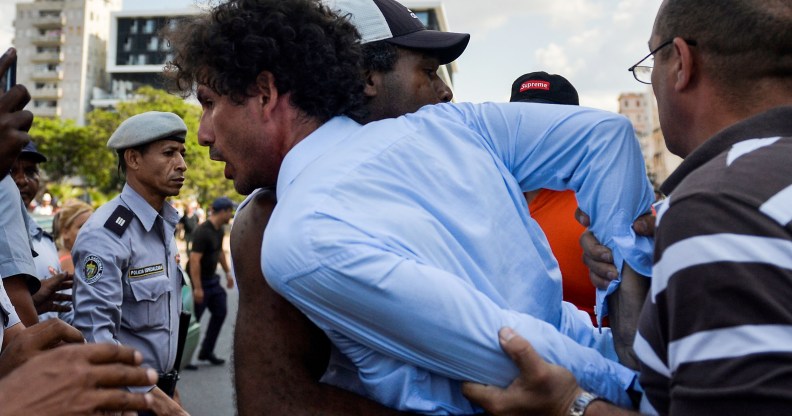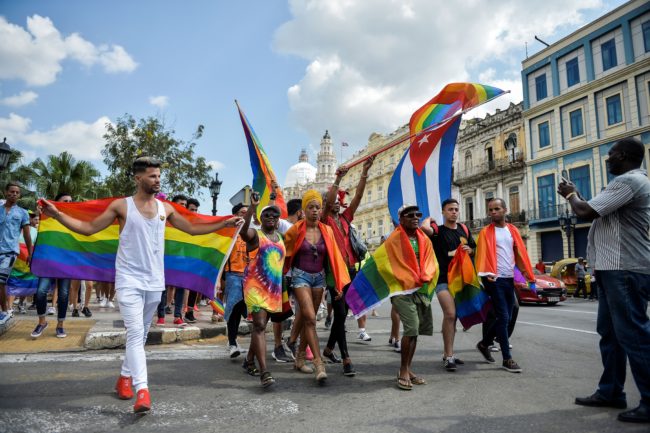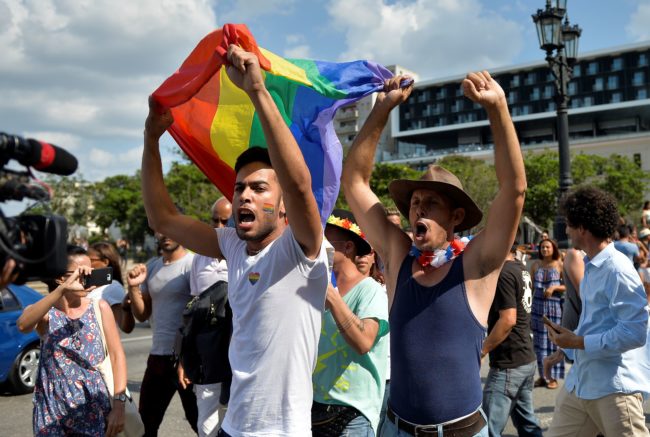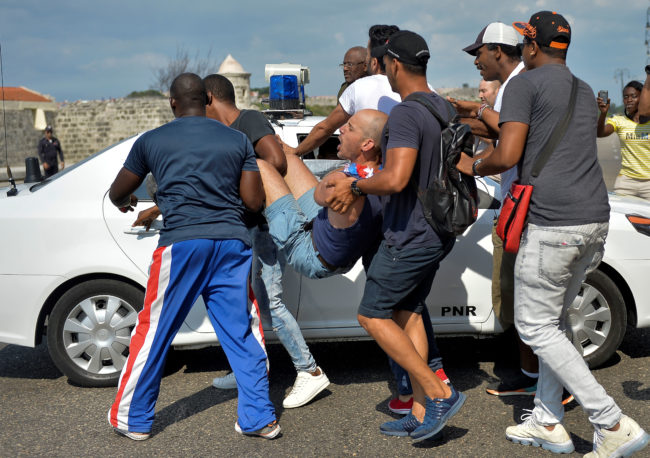Cuba LGBT+ activists arrested at ‘unauthorised’ Pride march

Cuban police arrest demonstrators taking part in the LGBT+ march in Havana, on May 11, 2019. (YAMIL LAGE/AFP/Getty)
At least three LGBT+ activists in Cuba were detained as police broke up an “unauthorised” Pride march.
Activists went ahead with a planned march against homophobia in Havana on Saturday (May 11), making it several blocks before several participants were arrested.

More than a hundred people participated in a demonstration for the LGBT rights in Havana on Saturday, an activity unauthorized by the government, amid tensions with the police. (YAMIL LAGE/AFP/Getty)
The government-run LGBT+ group CENESEX, which is fronted by Raúl Castro’s daughter Mariela Castro, had abruptly cancelled plans for the 12th annual official Conga against Homophobia and Transphobia march, blaming “new tensions in the international and regional context.”
The group said the decision was taken “in compliance with the policy of the Party, the State and the Revolution.”
Activists turned up to march despite cancellation of government-backed event
However, activists vowed to turn up anyway without permission, in a rare public show of defiance in the tightly-controlled country.
More than 100 demonstrators took to the streets with rainbow flags for the march, according to the BBC, but came up against a vast number of police and security service officials.

More than a hundred people participated in a demonstration for the LGBT rights in Havana on Saturday, an activity unauthorized by the government, amid tensions with the police. (YAMIL LAGE/AFP/Getty)
At least three people were arrested, reports suggest.
Rights activist Raul Soublett told Associated Press: “It was a complete success because we got so many people together despite all the expectations of government interference.
“It’s historic.”
Lidia Romero added: “This is because we don’t want to lose our rights to public space.”

Cuban police arrest demonstrators taking part in the LGBT+ march in Havana, on May 11, 2019. (YAMIL LAGE/AFP/Getty)
Some of the marchers criticised the police for breaking up the march, with Laydel Alfonso telling AFP: “I don’t believe this is right because we’re doing nothing wrong.”
Cuba has seen divisions over LGBT+ issues
The country’s government has come under strain over LGBT+ issues, abandoning a push towards equal marriage.
In December, lawmakers caved to pressure from evangelical church groups and stripped a definition of marriage as between “two people” from the country’s new Constitution.
The document instead includes no reference to a definition of marriage.
The change was allegedly made to appease evangelical and Catholic churches in the country, who oppose same-sex marriage and had already begun campaigning against the constitutional changes,.
The constitution was eventually passed after the concession.
The island’s new president Miguel Diaz-Canel has expressed support for gay marriage.
The leader, the first non-Castro to rule Cuba for generations, said he was in support of recognising marriage “between people without any restrictions” to help eliminate “any type of discrimination in society”.
Under the long reign of Fidel Castro, who rose to power in 1959, LGBT+ Cubans suffered persecution and discrimination.
In the 1960s and 1970s, police began to round up gay men and many LGBT+ people were imprisoned or forced into “re-education camps”.
In 2010, Castro apologised for the treatment of the LGBT+ community, telling Mexican newspaper La Jornada: “If someone is responsible, it’s me.”

